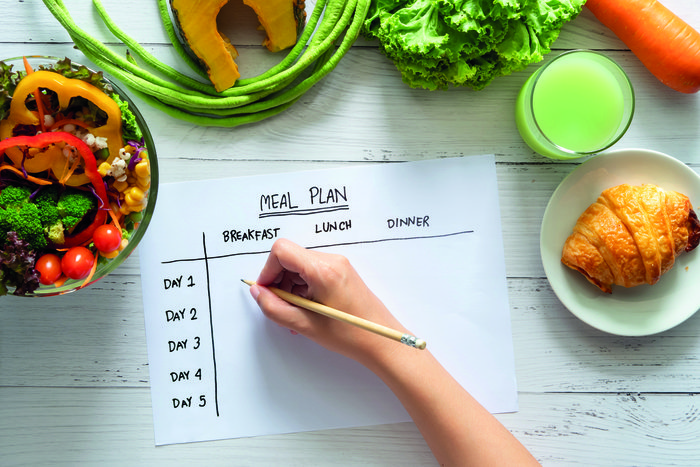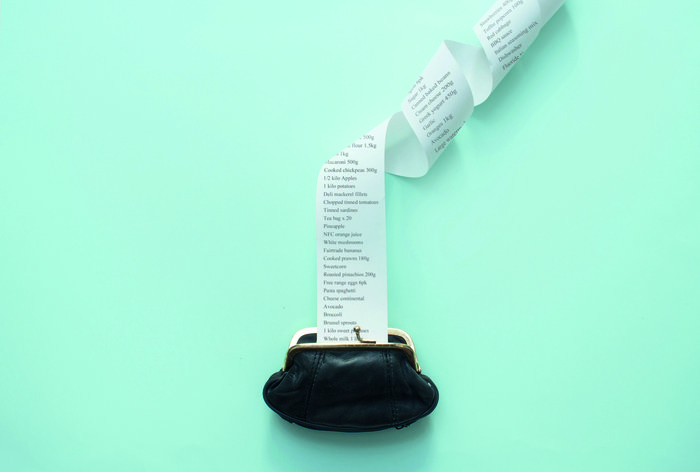Bulk buy essentials
If you are able to carry heavy shopping home or get it delivered, bulk buying long-lasting foods can save you money in the long run, as usually it is cheaper per kg of produce.
Batch cook and freeze a few favourites
Try cooking a few extra portions of one or two meals each week. Cooking in bulk ensures you use up all your ingredients, and you can defrost and reheat leftover portions when you don’t have the time or energy to cook.
Plan meals
A meal plan based on the ingredients you already have in your fridge, freezer and cupboards will help you to buy only what you need when shopping. Planning meals can also help you organise your shopping list, so you don’t end up wasting food.

Use leftover foodstuffs
Plan a “leftover night” once a week. Spare veggies can make delicious soup, stale bread can be toasted and whizzed up into breadcrumbs to top a pasta bake, and random bits of everything can be thrown together to make a salad.
Fill up on frozen food, tinned goods, and staples
Swapping fresh for frozen can be a great way to save money and make your ingredients last longer. Likewise, tinned goods and staples are often cheaper and last far longer than their fresh counterparts. Just remember to read the labels carefully and check with your renal dietitian about the best options for you.
Research what supermarkets are best value for money
Comparison websites like Trolley.co.uk can be a great way to quickly compare prices. Alternatively, next time you’re out, nip into a different supermarket with your shopping list and jot down the prices, then compare to your regular supermarket.
Shop in ethnic supermarkets
Many ethnic supermarkets sell certain goods at a cheaper price than the big supermarkets. You might and good value deals on fruit, vegetables and fresh herbs, as well as large packs of rice, noodles, nuts and spices.

Deals aren’t always the best option
Be sure to compare deals on like for-like items in your supermarket of choice. Read the labels to ensure you’re getting the most for your money, as sometimes deals aren’t as good value as they seem. In fact, some “deals” end up costing you more gram for gram, so always check the unit price on the label.
Stick to a shopping list and shop after meals
Studies show that shoppers who plan ahead are less likely to buy impulsively, so sticking to a shopping list helps you stay with your budget. If possible, try to do your food shop after you’ve eaten so you’re not so tempted to grab a few extra, unnecessary bits.
Enhance flavours by using spices
Dried herbs and spices will add flavour to your food without the need for excess salt. A good rule of thumb when swapping fresh herbs for dried alternatives in a recipe is to use one tablespoon of fresh herbs in place of one teaspoon of dried herbs.
Look for local supermarket schemes
Many supermarkets have schemes that can help you stretch your budget when food shopping. For example, Iceland have a 10% discount for anyone over 60 on Tuesdays, Lidl offer “Too Good to Waste” value fresh produce boxes and Asda Café offers discounts for children and over 60s. Be sure to ask a member of staff about schemes in your local retailers.
Use supermarket coupons and loyalty schemes
Supermarket coupons can be a free way to save a few pennies during your shop. e Money Saving Expert website has a constantly updated list of coupons that can help you cut costs at the checkout. It’s also worth signing up for any customer loyalty schemes your local shops offer.
Cut down on meat
You don’t have to have a meat-free lifestyle to save on your weekly shopping bill – eating meat less frequently, perhaps by having one or two vegetarian days a week, can make a big difference. Ease yourself into eating less meat by adding more grains, pulses and vegetables to your plate and substituting meat for plants in some of your favourite dishes. Replacing some of your meat intake each week with vegetables or pulses if you have CKD, can help support good kidney health.